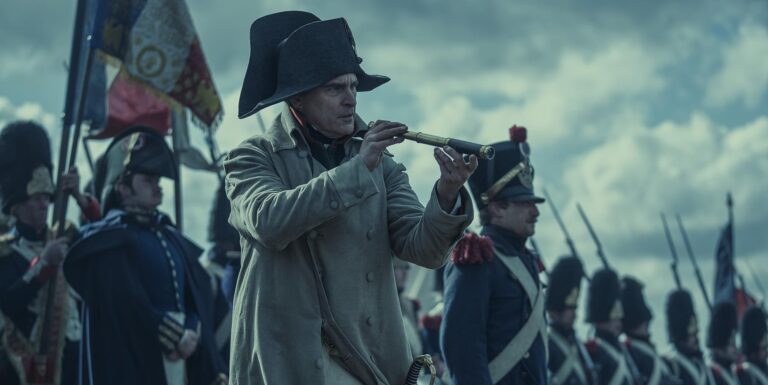Few can match director Ridley Scott when it comes to crafting the spectacle and chaos of large-scale historic battles. The 85-year-old auteur’s latest effort, Napoleon, certainly delivers in this regard, particularly when it comes to the French leader’s victory at the Battle of Austerlitz and his crushing, humiliating defeat at Waterloo. The scope of these skirmishes, captured in sweeping wide shots and punctuated by blood-drenched close-ups, is nothing short of breathtaking, and there’s an inherent level of exhilaration in watching one of our great creators operating at the height of his powers.
But surrounding these sequences is a sprawling, disjointed narrative, cramming Napoleon’s entire military career into a 153-minute epic that often lacks cohesion. It feels like much of the film’s connective tissue has been excised in favor of a more palatable running time; given that Scott has already revealed his original four-hour cut will be released via AppleTV’s streaming platform sometime next year, this is almost certainly the case. Unfortunately, the concessions made in pacing and editing for this abridgement are often so confounding and off-putting that viewers may have little interest in revisiting a future (and potentially better) version of the film.
Oscar winner Joaquin Phoenix steps into the title role, portraying Napoleon as a capable commander with a host of eccentricities and insecurities, obsessed with his own self image while also suffering from a monumental lack of self awareness. Inarguably a fearsome presence on the battlefield, he’s a buffoon in practically any other setting, prone to social faux pas and petulant outbursts, the likes of which feel almost Trumpian in their childishness; one could easily imagine the former US President snapping at a British diplomat “you think you’re so great because you have boats!” and then storming off as though he’s delivered a real zinger, and it’s no less hilarious when Phoenix does it here.
Grandiose battles and absurd declarations about lamb chops of divine providence notwithstanding, it’s Vanessa Kirby’s performance as Josephine that proves to be Napoleon‘s most compelling element. The military man has little defense for her intoxicating mix of grace and sensuality, and while he’s respected and beloved by the people of France, he’s second-in-command behind the closed doors of his own household. Even Josephine’s frequent philandering, so egregious that Napoleon abandons a lengthy campaign in Egypt to sail home and confront her, isn’t enough cause to send her packing; instead, his anger melts away and allows her to wrest control of the moment. “You’re nothing without me,” she purrs, and Napoleon can do naught but agree.
It’s shame that both performances are so hampered by the film’s editing and pacing issues. A bit of breathing room for some of these more intimate moments would have gone a long way toward enriching the portrayal of Napoleon and Josephine’s relationship and its shifting power dynamics, but the emotional depth isn’t quite there, likely relegated to the cutting room floor. One hopes the promised director’s cut of Napoleon will feel like a more complete experience, where the magnificent battlefield sequences serve to complement the character-driven storytelling, rather that overshadow it. As it stands, the film’s spectacle-over-substance approach, even with occasional flashes of brilliance, is likely to leave audiences yearning for something a bit more fulfilling.

